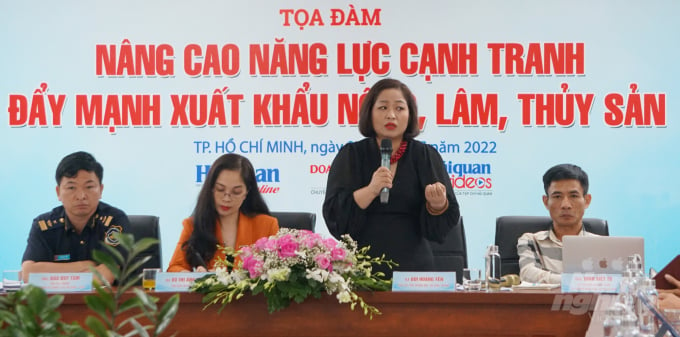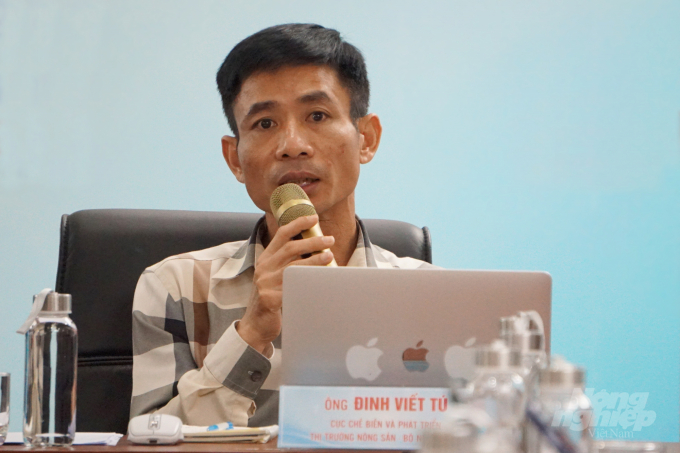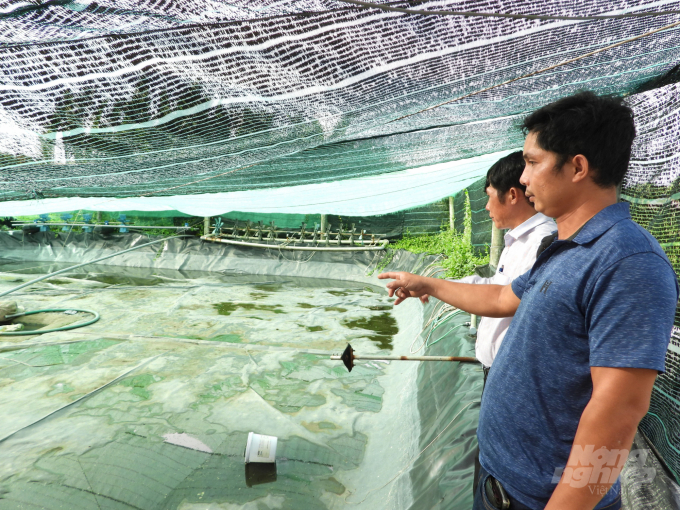June 21, 2025 | 00:55 GMT +7
June 21, 2025 | 00:55 GMT +7
Hotline: 0913.378.918
June 21, 2025 | 00:55 GMT +7
Hotline: 0913.378.918

Workshop on "Improving competitiveness, promoting export of agricultural, forestry and fishery products". Photo: Nguyen Thuy.
At the Workshop on "Improving competitiveness, promoting export of agricultural, forestry and fishery products" held on July 26 in Ho Chi Minh City, Mr. Dinh Viet Tu, Deputy Director of the Sub-Department of Agricultural Product Processing and Development Region I (Ministry of Agriculture and Rural Development) said that: despite the heavy impacts of the Covid-19 pandemic as well as political conflicts on a global scale, Vietnam's export of agricultural, forestry and fishery products within the first six months of 2022 reached nearly 28 billion USD. This is an increase of nearly 14% compared to the same period in 2021.
According to Mr. Tu, this is a positive signal, affirming the position of Vietnamese agriculture, forestry and fisheries in the international arena. This is especially true after Vietnam has signed 15 new-generation free trade agreements with the majority of the developed economic regions. This is an opportunity for Vietnam to expand and develop the market, affirming its position, potentials and strengths in the agricultural, forestry and fishery sector.
According to the General Department of Customs, Vietnamese agricultural, forestry and fishery products are present in over 180 countries and territories around the world, many of which reach over 1 billion USD in export turnover, such as coffee, rice, vegetables, shrimp, pangasius, etc.

Mr. Dinh Viet Tu, Deputy Director of the Sub-Department of Agricultural Product Processing and Development Region I, Ministry of Agriculture and Rural Development. Photo: Nguyen Thuy.
Ms. Bui Hoang Yen, Deputy Head of the Southern Working Group under the Department of Trade Promotion, Ministry of Industry and Trade, said that businesses pay special attention to solutions that utilize the advantages brought by the EVFTA. It is necessary to actively seek information to fully grasp EU commitments as well as information on tariff preferences.
According to Ms. Yen, businesses must determine the production scale for each product line, apply mechanization into production as well as ensure uniform quality. They must transform product structure along the value chain, from exporting raw materials to processed products.
This also includes tranformation from simple processed products to deep processed products, from low value added products to high value added products. In addition, investment in innovation and improvement of the quality of machinery, equipment, production technology, production processes, corporate governance methods, and quality of human resources will be effectively promoted.
On the other hand, businesses will strengthen linkages in production - transportation - processing - consumption between raw material suppliers and final product production, between farmers - the state - scientists - entrepreneurs; between domestic enterprises and FDI sources; Apply standards suitable for export markets including technical standards, food safety and environment.
Mr. Dinh Viet Tu added that, several products are prioritized for the implementation of geographical indications and qualified for the planting area code, packaging facility code in accordance with the standards of the importer. Thereby strengthening the advantages, seizing the initiative in the source of raw materials, increasing the added value of the exported products. Subsequently, businesses need to properly invest in processing facilities and warehouses to preserve agricultural and aquatic products.
"Vietnam currently has over 7,500 businesses with deep processing facilities. However, the volume of agricultural, forestry and fishery products in Vietnam is substantial and the processing facilities' capacity has not met the demand, leading to the stagnation in the flow of Vietnam's goods, especially during the peak season, and the processing machineries are often overloaded", said Mr. Tu.

Organizing shrimp farming areas according to the value chain links. Photo: Nguyen Thuy.
Mr. Tu recommended that businesses should focus on establishing and developing brands to avoid commercial fraud. They need to focus on producing high quality products, because this is the core issue.
Regarding state management agencies, it is necessary to focus on developing policies to support and encourage synchronous mechanization in the production and processing of agricultural, forestry and fishery products.
As for local governments, training for high-quality human resources in the management and operation of production is a necessity. Moreover, localities need to develop logictis to resolve difficulties and challenges in transportation. In addition to domestic support, units should advise the province to build appropriate mechanisms and policies to attract investments from foreign businesses and expand production areas.
Vietnam has successfully entered into 15 free trade agreements, so in order to compete in terms of quality with countries exporting products similar to Vietnam's, it is necessary to improve the value and competitiveness of our national products.
Translated by Nguyen Hai Long

(VAN) The waste of resources from agricultural by-products and the situation of counterfeit and poor quality goods in production causing losses of thousands of billions were pointed out by the National Assembly deputy.

(VAN) After 5 years of implementation, the CAI initiative has helped coffee growers change their farming practices, moving toward responsible agriculture that meets global export standards.

(VAN) The primary prerequisite for the comprehensive and robust integration of Vietnam's livestock sector into the global value chain is the establishment of a disease control system.

(VAN) The results of national programs are essential for establishing a contemporary livestock sector that is well-equipped to meet the demands of both domestic and international markets, with robust biosafety standards.

(VAN) The UNESCO Global Geopark revalidation of Non nuoc Cao Bang and the transition to a two-tier administrative model are presently undergoing a pivotal moment in Cao Bang, the northernmost province of Vietnam.
/2025/06/13/5330-2-004539_953.jpg)
(VAN) Changing policy mindset and removing investment barriers are urgent requirements to open up new development space for enterprises in the agricultural sector.

(VAN) The areas include the restoration of five million hectares of marine ecosystems.